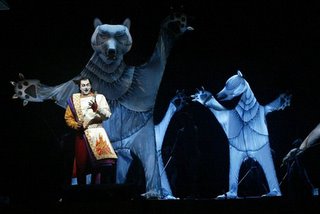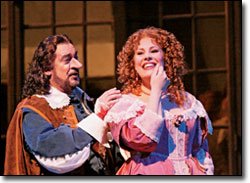


On the eve of a triple-header this past week of Flute-Flute-Bergerac, I decided the only sane way to manage my opinions would be in one brief follow-up post. And here we are.
Having missed it last season, I went to Taymor's oh-so-Magic Flute carrying a fairly significant bit of anticipation, and an impressive assortment of preconceptions, both positive and negative. In the end it was, as I expected, totally delightful and over the top. My biggest sentiment afterward, directed in good humor at critics and blogger friends, was something to the effect of "Dear Everyone, Lighten up. Love, Jonathan". I find a lot of humor in people getting so uptight and uncomfortable about a production that is essentially three+ hours of highly imaginative, visually stunning frivolity. It undeniably works with this text and even moreso with Mozart's music. It's just sweet enough, just scary enough, and frankly just senseless enough to perfectly support what is in essence a musically sophisticated vaudeville piece.
And I have to speak to this pervasive argument--the sort of "silver-bullet-no-one-can-argue-this" statement I find so many making about this production: "It distracts from the SINGING" Oh, the singing! Right, right, the singing. God forbid there should be something...ANYTHING to look at while Nathan Gunn inaudibly sings "Der Vogelfänger Bin Ich Ja." I think if anyone NOT insistent on being just a bit above this likeable production actually stepped back for a moment they would realize that it is only "distracting" from the singing when the singing itself is not so hot or, in the case of Gunn and Christy, not so audible. I never for a moment was distracted from Miklosa, Dunleavy, Cutler or Robinson who all turned in very fine if not wholly overwhelming performances (with the possible exception of Robinson, who is about as good a Sarastro as I can recall).
To throw my critical hat in the ring, however, I will say that some of the costumes were retarded. There was a gaggle of choristers at one point that looked like they were in a choir at some sort of Gay Christian Summer Camp in Santa Cruz. If you missed them, they were standing just upstage of the construction paper nuns and just stage left of the felt fingers.
Onward! Last night I had the unexpected pleasure of seeing, and hearing for the first time, Alfano's
Cyrano de Bergerac. I gotta admit, I was poised to not like this one. An unpopular cover starring in an obscure opera by a composer known almost solely for his massively edited (thanks Toscanini) last ten minutes or so of
Turnadot. At best, I expected to find it a sort of bearable curiosity. Instead, I was delighted to find it a rather lush, emotional piece with two great roles. Unfortunately, Domingo was again "Indisposed" last night ("In the Shower, In the Bathroom"). His cover, Antonio Barasorda, has a sort of unpleasant, wobbly, though not unlistenable voice. I would, however, like to hear the piece with a stronger tenor.
The real star of the evening was Sondra Radvanovsky as Roxane. A
particularly savvy opera fan recently turned me on to the wonders of this American soprano. She is sort of that hard to find perfect balance of presence and delicacy--creating a beautiful sound yet never losing full command of the stage. Having only heard her (at least recently) in a couple acts of a ho-hum
Die Fledermaus several weeks back, it was nice to see her sing something with significantly more heft, both musically and emotionally.
br>
Zambello's production is tasteful and has a sweet, not overly obvious storybook feel to it. I also noticed that the bakery scene in the second act looks remarkably like the set for MARTHA. I did not, however, receive a free Michelin guide, or even a Mario Batali cookbook on the way out.
Afterward, I popped into Tower and picked up a
Dialogue des Carmelites recording I have been wanting. It was on sale...I listened to it as I was drifting to sleep last night and woke up to the repeated guillotine *whacks*, which, at 3AM, I found particularly disconcerting.
 I know everyone and their mother did this at the beginning of the month, but I finally got to the Gheorghiu Traviata. And she wrecked me, yo.
I know everyone and their mother did this at the beginning of the month, but I finally got to the Gheorghiu Traviata. And she wrecked me, yo.




